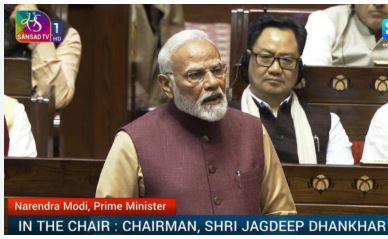

New Delhi, February 6: Prime Minister Narendra Modi delivered a strong rebuke to the Congress Party in the Rajya Sabha on Thursday, accusing it of prioritizing "family first" while the Bharatiya Janata Party (BJP) focuses on "nation first" and its core principle of "sabka saath, sabka vikas" (inclusive development for all).
Responding to the Motion of Thanks on the President's address, Modi criticized Congress for what he described as its "hatred and anger" toward B.R. Ambedkar, the architect of India’s Constitution, highlighting the party's failure to honor him with the prestigious Bharat Ratna. He remarked that while Congress now reluctantly utters "Jai Bhim," they struggle to do so with sincerity.
The Prime Minister also aimed at Congress’s economic policies, specifically the ‘Licence Raj’ era, which, according to him, stifled growth, bred corruption, and tarnished India's global image. He pointed out that the "Hindu rate of growth" became a symbol of economic stagnation under Congress's leadership, and he accused the party’s "royal family" of mismanaging the economy, causing widespread harm to the Hindu community's reputation.
Modi also recounted the imposition of an Emergency by the Congress, during which opposition leaders were imprisoned and even artists, writers, and film stars were penalized for not praising the ruling party. He criticized the Congress for undermining democracy and curtailing freedoms during this dark period.
In his address, Modi emphasized that while it is natural for opposition parties to critique the government, undermining others without offering constructive policies can impede progress. He stressed the importance of collective efforts to make India a "Viksit Bharat" (developed India), a vision that he said extends beyond just the ruling party and must be embraced by all.
Revisiting the abuses of the Emergency, the Prime Minister condemned Congress for turning the country into a "prison" for the sake of power, suggesting that millions of families were harmed to fulfill the ego of a political dynasty. He celebrated India's newfound freedom and progress since breaking free from Congress's grip, pointing to initiatives like ‘Make in India’ as evidence of the country’s growing self-reliance.
Modi also defended the BJP-led government's push for a Uniform Civil Code (UCC), claiming it was rooted in the original intentions of the Constitution’s framers. He argued that while opposition to the UCC may exist, the BJP remains committed to its implementation as a matter of principle, guided by constitutional ideals.
Throughout his speech, the Prime Minister reiterated the BJP’s commitment to the development and welfare of all citizens, particularly the underprivileged and the emerging middle class. He pointed out that the BJP government’s approach of "santushtikaran" (satisfaction for all) contrasts sharply with the Congress’s politics of appeasement, where specific groups were favored at the expense of others.
Modi praised the BJP’s focus on resource optimization and inclusive policy implementation, asserting that the government’s efforts have led to tangible improvements across all sectors. He highlighted the success of initiatives that ensure no one is left behind and that benefits reach the intended beneficiaries.
He also spoke about the BJP’s commitment to social harmony, rejecting attempts to sow division through caste-based politics. Referring to the party's actions in securing constitutional status for the OBC commission, Modi emphasized that the BJP’s policies were designed to uplift all sections of society without creating divisions or perpetuating historical grievances. He cited the 10 percent reservation for economically backward groups, which was implemented without taking away from existing quotas, as a step toward inclusive progress.
In closing, Modi mentioned the historical repression under Congress rule, recalling the arrests of prominent cultural figures like poet Majrooh Sultanpuri and actor Balraj Sahni for protesting against the regime, as well as the banning of Lata Mangeshkar's brother from All India Radio for wanting to honor Vinayak Damodar Savarkar. These examples, he said, exemplify the Congress's disregard for dissent and free expression.